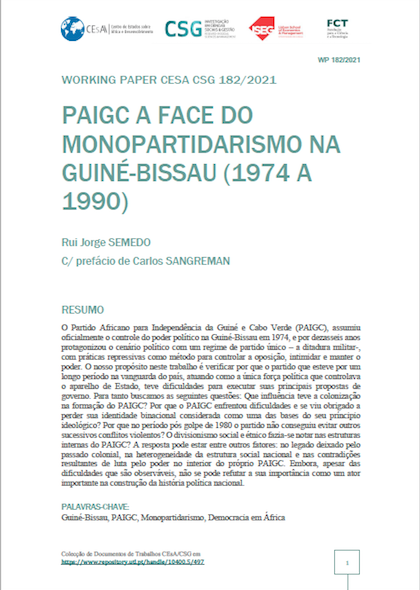Working Paper 182/2021: PAIGC a Face do Monopartidarismo na Guiné-Bissau (1974 a 1990)

Title: Working Paper 182/2021: PAIGC a Face do Monopartidarismo na Guiné-Bissau (1974 a 1990)
Author(s): Semedo, Rui Jorge
Publication Date: 2021
Publisher: ISEG – CEsA/CSG
Quotation: Semedo, Rui Jorge (2021). "PAIGC a face do monopartidarismo na Guiné-Bissau (1974 a 1990)". Instituto Superior de Economia e Gestão – CEsA/CSG - Documentos de Trabalho nº 182/2021.
Abstract: The African Party for Independence of Guinea and Cape Verde (PAIGC) officially took control of political power in Guinea-Bissau in 1974, and for sixteen years has starred in the political scene with a single-party regime – a military dictatorship–with repressive practices as a method to control the opposition, intimidate and maintain power. Our purpose in this work is to verify why the party that was for a long time at the forefront of the country, acting as the only political force that controlled the state apparatus, had difficulty executing its main government proposals. For this we seek the following questions: What influence did colonization have on the formation of the PAIGC? Why did the PAIGC face difficulties and were forced to lose its binational identity considered as one of the bases of its ideological beginning? Why in the post-coup period of 1980 could the party not prevent other successive violent conflicts? Was social and ethnic divisionism noted in the internal structures of the PAIGC? The answer may be among other factors: in the legacy left by the colonial past, in the heterogeneity of the national social structure and in the contradictions resulting from the struggle for power within the PAIGC itself. Although, despite the difficulties that are observable, it cannot be refuted its importance as an important player in the construction of national political history.
Identifier: http://hdl.handle.net/10400.5/21101
Category: Working paper
Abstract:
The African Party for Independence of Guinea and Cape Verde (PAIGC) officially took control of political power in Guinea-Bissau in 1974, and for sixteen years has starred in the political scene with a single-party regime – a military dictatorship–with repressive practices as a method to control the opposition, intimidate and maintain power. Our purpose in PAIGC a face do monopartidarismo na Guiné-Bissau (1974 a 1990) is to verify why the party that was for a long time at the forefront of the country, acting as the only political force that controlled the state apparatus, had difficulty executing its main government proposals. For this we seek the following questions: What influence did colonization have on the formation of the PAIGC? Why did the PAIGC face difficulties and were forced to lose its binational identity considered as one of the bases of its ideological beginning? Why in the post-coup period of 1980 could the party not prevent other successive violent conflicts? Was social and ethnic divisionism noted in the internal structures of the PAIGC? The answer may be among other factors: in the legacy left by the colonial past, in the heterogeneity of the national social structure and in the contradictions resulting from the struggle for power within the PAIGC itself. Although, despite the difficulties that are observable, it cannot be refuted its importance as an important player in the construction of national political history.
Quotation:
Semedo, Rui Jorge (2021). “PAIGC a face do monopartidarismo na Guiné-Bissau (1974 a 1990)”. Instituto Superior de Economia e Gestão – CEsA/CSG – Documentos de Trabalho nº 182/2021.





